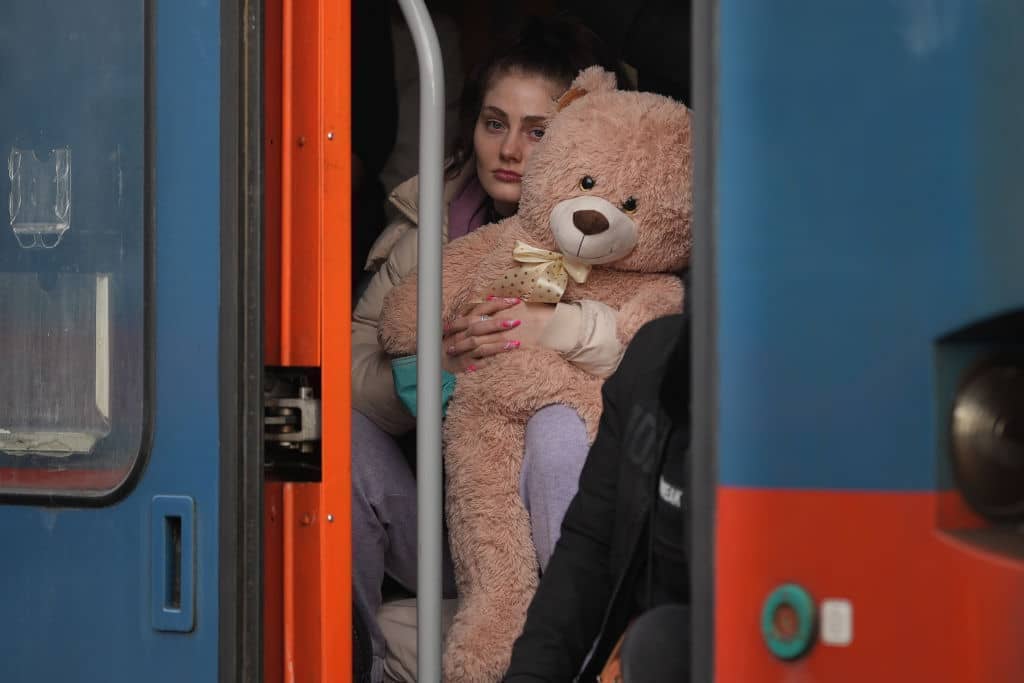Among opposition politicians there is a new question being asked of the war in Ukraine: why has the UK not taken in more refugees? A mere 50 visas were initially issued by the Home Office. Meanwhile, Poland had taken in more than a million Ukrainians, Hungary 180,000, Slovakia 128,000 and even little Moldova 83,000.
Labour shadow home secretary Yvette Cooper, whose now-ancient personal offer to accommodate refugees in one of her own homes remains mysteriously unmentioned, hit out at a Home Office update that 300 family scheme visas had in fact been issued. She branded the revised number ‘shockingly low & painfully slow’.
Never mind that the countries listed above actually border Ukraine, while the UK is more than 1,000 miles away. And never mind that Ukraine’s ambassador to London Vadym Prystaiko has said it was easier for ‘nations around us’ to take in refugees, while ‘we will ask nations that are much further distance-wise to support this effort of the smaller nations financially to help them’. No, clearly our virtue is to be measured solely by the number of Ukrainians we take in for shelter.
Of course, this government appears too scared to defend itself on the issue of migration. Only a fool would have expected a Cabinet minister to set out a reasoned case as to why the UK is not perhaps well-placed to throw open its doors to big numbers of Ukrainians. In fact, Defence Secretary Ben Wallace – the minister generally agreed to have responded best to the war in Ukraine – was sent out onto the airwaves this morning to guarantee that Britain’s refugee resettlement scheme was going to be ‘enormous’. He said it would encompass 200,000 family visas plus an ‘unlimited’ additional number on humanitarian grounds.
The Home Office has, in fact, already turned itself into the nation’s biggest hotelier
Perhaps this altogether uncapped offering will even satisfy Cooper. A general consensus may soon emerge across Parliament that, on this matter at least, the virtue of the British public authorities is intact. I doubt I am alone in finding this iteration of the virtue-signalling Olympics particularly irksome.
A guide prepared for ex-convicts by the Ministry of Justice about how to survive sleeping rough was leaked to the Daily Telegraph at the weekend. One particularly stark line – which was later removed from the draft document – jumped out. It said:
‘The truth is that there is not enough housing for everyone and therefore there is a risk you could be released with nowhere to live.’
This was a rare official Whitehall admission that the pressure on Britain’s housing stock is already so intense that some prisoners may have to be sent out at the end of their sentences with no accommodation available.
There are multiple other signs of this housing crisis: more than a million British families on social housing waiting lists; several thousand homeless ex-services personnel, with up to 400 sleeping rough at any one time.
Then there is the ongoing shambles of trying to house the 15,000 Afghan refugees taken in last summer. More than six months on, 12,000 of them are still in ‘hotel bridging accommodation’. Ministers are unable to guarantee a date for finding them permanent homes, despite more than 300 local authorities having joined a frantic effort to ‘source’ housing for them.
The Home Office has, in fact, turned itself into the nation’s biggest hotelier. On top of the 12,000 Afghans, it is putting up another 25,000 asylum seekers, some of whom are likely to be undocumented young men who have boated across the Channel. They came to the UK from distinctly non war-torn France over the past three years. The total cost to the taxpayer is approaching £5m a day, or £150m a month, or £1.8bn a year. Home Secretary Priti Patel has admitted the situation is ‘thoroughly inadequate’, adding:
‘We do not want people in hotels, we are looking at dispersed accommodation.’
So here is the big reveal for the virtue signallers among you: had the Government effectively deterred the unlawful cross-Channel landings of the past three years then it might have half a chance of coping with a big influx of Ukrainian refugees now. But it didn’t, so it doesn’t. Anyone who supported the Channel crossing status quo – including ministers – should now acknowledge it has all but denuded the public realm of vital resources in this regard.
While many of the up to 200,000 Ukrainians expected under the family reunification route may have accommodation they can stay in for a while at least, those coming in under the humanitarian route won’t have. And offers of spare bedrooms pledged in the emotional heat of the moment by the likes of Cooper have a nasty habit of not always materialising in the cold light of day.
Aneurin Bevan once claimed that the ‘language of priorities is the religion of socialism’. In fact, it is the basis of all realistic politics. So who must lose out in order to fulfil this ‘enormous’ offer to Ukrainians who could far more easily, affordably and sensibly be housed in the depopulated and neighbouring countries of Eastern Europe?
Will it be the 12,000 Afghans who must by now be heartily sick of those splashy little cartons of UHT milk they dispense in three-star hotels? Or will 25,000 Channel-hoppers be thrown out to wander the streets? Or maybe more ex-prisoners will be taught how to live in cardboard boxes? Or more forces veterans left in the gutter? Or those million-plus Brits patiently waiting for a council house will be told to stick another decade on their expected queue-time? Most likely, all of them will suffer. After all, they are not this year’s cause.







Comments